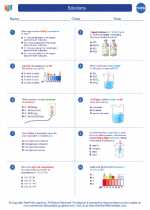High School Chemistry: Molds
Molds are a type of fungus that play a significant role in the environment, food production, and even in the field of medicine. They are a diverse group of microorganisms that can be found almost anywhere, and can have both positive and negative effects on human life.
Structure and Characteristics of Molds
Molds are made up of multiple cells and have a filamentous structure. They typically reproduce by forming spores, which are small and lightweight, allowing them to be easily dispersed by air, water, or insects. Molds can grow on a variety of surfaces, including food, plants, and indoor surfaces such as walls and ceilings.
Role of Molds in Nature
Molds play a crucial role in the natural environment by breaking down organic matter. They are essential for the decomposition of dead plants and animals, and help in recycling nutrients back into the ecosystem. Additionally, molds are used in the production of certain foods and beverages, such as cheese, soy sauce, and some types of alcoholic beverages.
Health Effects and Concerns
While molds have important ecological functions, they can also pose health risks to humans. Exposure to molds can cause allergic reactions, respiratory issues, and in some cases, more serious health problems. Indoor mold growth can be particularly concerning, as it can lead to structural damage in buildings and negatively impact indoor air quality.
Preventing and Controlling Mold Growth
To prevent mold growth, it is important to control moisture levels in indoor environments, as molds thrive in damp conditions. Regular cleaning and proper ventilation can also help reduce the likelihood of mold growth. In the case of food production, specific measures are taken to prevent mold contamination and ensure food safety.
Study Guide
- Describe the structure of molds and how they reproduce.
- Explain the role of molds in the natural environment and their significance in food production.
- Discuss the potential health effects of mold exposure and how to prevent mold growth in indoor environments.
- Research and present a case study on a specific food product that involves mold in its production process.



